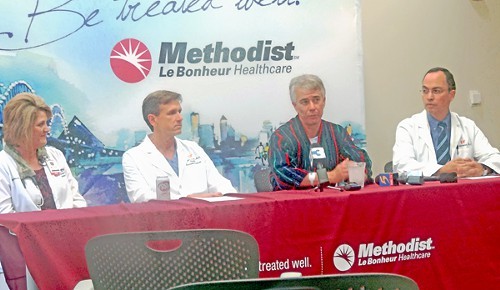
- JB
- L to r: Moore, Eason, Mulroy, Campos
As the Flyer first reported in March, Shelby County Commissioner Steve Mulroy had resolved to donate one of his kidneys to the National Kidney Registry through the UT-Methodist Transplant Institute, the Registry’s sole medical partner in Tennessee.
That was then, this is now — mere days after the Institute’s famed director, Dr. James D. Eason, extracted the kidney via laparoscopic surgery on Tuesday. And if the science of transplant surgery should need a poster boy to represent its potential to the general public, it couldn’t do much better than Commissioner Mulroy, whose regular job is that of a University of Memphis law professor.
Mulroy appeared at a press conference at Methodist Hospital on Union Ave. Thursday with Dr. Eason; Dr. Luis Campos, who administers exchanges along the organ-transplant network; and transplant coordinator Melissa Moore.
Wearing a pajama robe, but looking more like a denizen of the Playboy Mansion than of a hospital ward, Mulroy was bright-eyed and ebullient, cracked jokes, did impressions, elaborated on the fine points of his surgery, and vowed to be in full “argument mode” for the next Commission meeting on Monday, when a contentious debate on a gun-rights resolution is expected.
On the other side of that debate from Mulroy will be fellow Commissioner Terry Roland, author of the resolution and no miser with energy himself. Mulroy was asked: Would he be able to handle Roland in debate?
” I don’t know if anyone is ever up to handling Terry Roland,” he answered. “That’s a tall order. But I will say that, come Monday, I will be there. I will do my duty for the voters of Shelby County.”
Mulroy this week became what is known in the transplant-surgery world as an “altruistic donor” — meaning that he did not donate his kidney to a particular individual but to the Registry at large, so that his organ might go — as Mulroy said, quoting (and doing) the Ned Flanders character from a Simpsons TV episode about transplant surgery — “to whom it may concern.”
The way he and the Institute personnel explained it Tuesday, the acquisition of an unencumbered organ makes it easier to arrange ideal matches through the transplant network’s computerized system, to “break the log jam,” in Mulroy’s words. As Dr. Eason said, “We didn’t just do one transplant on Tuesday, We did six.”
Dr. Eason emphasized that the laparoscopy done on Mulroy was relatively “non-invasive,” done via a small incision and employing a camera and a fiber optics system — or in Mulroy’s words, “so easy-in-easy-out it’s not a big deal.”
Asked if he’d like to meet the recipient of his donated kidney, Mulroy affirmed that he would, jesting, “First, I’d like to find out if they’re a registered voter in Shelby County.”
Mulroy said, “People ask me, ‘can you still drink?’” He said that, “as a good Irish Catholic,” he intended to. A running and exercise addict, he added that he expected eventually to resume his full round of activities. “It doesn’t change your life all that much,” he said. “The remaining kidney grows and takes over the function of the other kidney.”
Mulroy’s wife Army, daughter Molly, and son Quinn were on hand for the press conference. Asked if his loss of a kidney might in any way inconvenience them, he said he had done extensive preliminary research on the point and argued convincingly that their medical histories made the odds infinitesimally small that they would ever be in need of a kidney transplant requiring him as a donor match. He had looked for “red flags” and was assured there were none, he said.
Dr. Eason said, “We do approximately 35 living-donor transplants a year. We’d like that to be more.”
Melissa Moore is the Institute’s contact person for potential donations and can be reached at (901) 516-8466.